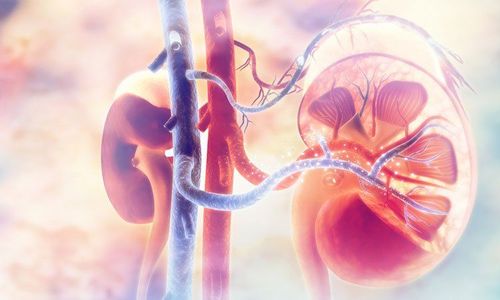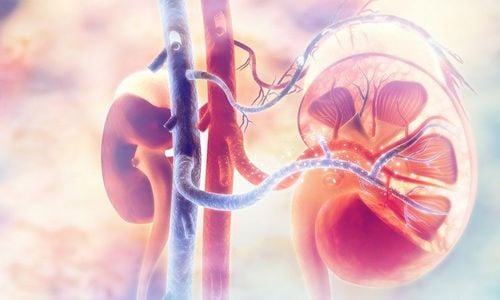This is an automatically translated article.
Article by Specialist Doctor II Pham Tien Ngoc - Emergency Doctor - Emergency Department - Vinmec Central Park International General Hospital.
Hematuria is a common symptom in many common diseases due to many different causes. Blood in the urine is not an emergency, but can be a sign of a serious medical condition. Therefore, when there are symptoms of hematuria, it is necessary to immediately go to a medical facility to find the cause and intervene promptly.
1. Circumstances of detecting hematuria
Hematuria can be detected in the following situations:
The patient may find it incidentally when the color of urine is pink, bright red, or dark red when urinating; Incidentally discovered by urinalysis of red blood cells or casts of red blood cells in the urine; Hematuria is sometimes detected in the setting of renal disease with proteinuria....
2. Causes of bloody urine
2.1. Causes of glomerular hematuria IgA nephropathy:
Common in young men. Due to abnormal immunoglobulin IgA, it binds to other IgA instead of bacteria. Clinical diversity: Gross or microscopic hematuria (most), proteinuria or no → progression to end-stage renal disease (5-25%). Subclinical manifestations: Blood IgA concentration increased, kidney biopsy IgA deposition in glomerular mesenchymal. Microscopic image of IgA nephropathy:

Thin basement membrane nephropathy (including Alport syndrome):
Isolated hematuria, familial, benign, does not progress to renal failure. Microscopic image of thin basement membrane nephropathy:

Alport syndrome:
Due to structural abnormalities of the renal basement membrane: Type IV collagen deficiency, hematuria accompanied by deafness, visual disturbances, familial, poor outcome, progression to renal failure. Microscopic image of Alport kidney disease:

Primary and secondary glomerulonephritis:
Post-streptococcal glomerulonephritis, focal glomerulosclerosis, membranous glomerulonephritis, Lupus glomerulonephritis,... Extraglomerular causes:
Tuberculosis nephritis - interstitial: Interstitial nephritis due to allergic mechanism, nephropathy due to analgesics, polycystic kidney disease, acute pyelonephritis, tuberculosis, transplant rejection; Renal tubular epithelium: Urinary tract infection, calculi, malignancy, exercise, trauma, renal papillary necrosis, parasitic disease (schistosoma); Vascular: Coagulopathy, anticoagulant overdose, thrombosis, arterial embolism, arteriovenous fistula, Nutcracker syndrome, renal vein thrombosis; Other: Hypercalciuria, increased uric acid, sickle cell disease.
3. Problems when approaching patients with hematuria:
There are 4 issues to be identified when approaching and treating hematuria as follows:
Determine whether hematuria is present or not; Assess the level; Find the source of hematuria; Determine the cause of the bleeding. 3.1. Identify hematuria By color of urine:
Pink, bright red or dark red (sassafras red). May confuse dyes, drugs, hemoglobin, myoglobin...; Not determined for sure. Dipstick test strips:
Thanks to peroxidase activity, which catalyzes the reaction, the color indicator will turn green. Detect when the amount of HC 15-20,000/ml; Possible confusion: hemoglobin, myoglobin... Urinalysis under the microscope:
Called hematuria when > 5 RBCs / QT 40 or Addis residue > 5000 RBCs / 1 min; Determined for sure. 3.2. Diagnostic schema

Lược đồ chẩn đoán bệnh tiểu máu
3.3. Evaluation of the degree of hematuria Gross hematuria: The color of urine is red or dark. Hematuria when Addis residue > 30,000 RBCs / 1 minute; Microscopic hematuria: Hematuria when > 5 RBCs / QT 40 or Addis residue > 5000 RBCs / 1 min. 3.4. Origin of hematuria Glomerular: Microscopic hematuria, red blood cells deformed, red blood cell casts, no blood clots, proteinuria > 0.5g/24h, edema, hypertension, little urine...; Extraglomerular: Gross hematuria, blood clots, urinary tract epithelial cells.

4. Laboratory tests to be performed
Biochemical tests:
Suggested possible cause of glomerulonephritis: ASO (post-streptococcal infection), ANA, anti ds DNA (Lupus); C3, C4 (membrane glomerular disease); anti GBM; Hemoglobin electrophoresis (sickle HC disease); measure urinary calcium; uric aciduria; PSA test (in prostate cancer); BTA (bladder cancer). Indications for renal biopsy in hematuria:
Hematuria with renal failure with polyuria, red blood cell casts; with abnormal ANA, Ds DNA, C3, C4, suspected familial disease. Cancer screening:
Patients over 40 years of age with gross hematuria, recurrent urinary tract infections, occupational exposure to chemicals or dyes, pelvic radiation therapy, high doses of cyclophosphamide, abuse of antiretroviral drugs pain, schistosomal infection. Abdominal ultrasound:
Ultrasound is a highly sensitive and specific method to detect kidney stones, ureters, hydronephrosis and some other causes that can cause hematuria such as tumors, inflammation,..., This is a simple, cost-effective and repeatable method. KUB (Kidneys-Ureters- Bladder):
Can detect contrast stones in the urinary system in terms of shape, size, location and number, can detect other contrast abnormalities in the abdomen. UIV (Urographie intraveineuse):
Used to take X-rays of the urinary system such as (kidneys, ureters and bladder), this is a technique of nephrography with intravenous contrast. CT scan of abdomen, urinary system:
This method is performed quickly, without intravenous contrast, has high sensitivity for small stones, allows diagnosis of other abnormalities in the urinary system and outside the urinary system. In addition, abnormalities of the urinary system such as congenital malformations, renal abscesses, renal tumors can be detected... Schema of the laboratory tests to be performed on hematuria patients:

In short, hematuria is a symptom of a disease, the cause may be an abnormality of the kidneys or urinary tract. Hematuria is not an emergency symptom but is a sign of serious illness. Therefore, when seeing blood in the urine, the patient should immediately go to a medical facility to do tests to find out the cause and take appropriate treatment.
Please dial HOTLINE for more information or register for an appointment HERE. Download MyVinmec app to make appointments faster and to manage your bookings easily.













